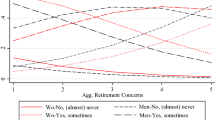Abstract
A vacancy to be filled on the Supreme Court is a relatively rare event; continuity of service is the norm. In this paper I determine the circumstances under which justices decide to retire and, by extension, why they remain on the bench. Using a discrete-time method I find that political considerations do not appear to matter. Justices are more likely to retire when they are physically infirm and have qualified for pension benefits. But the more justices participate in the Court's activity, as evidenced by the number of opinions or dissents they write, the less likely they are to leave voluntarily.
Similar content being viewed by others
References
Abraham, Henry J. (1985).Justices and Presidents, 2nd ed. New York: Oxford University Press.
Aldrich, John H., and Nelson, Forrest D. (1984).Linear Probability, Logit, and Probit Models. Beverly Hills, Calif.: Sage Publications.
Allison, Paul D. (1982). Discrete-time methods for the analysis of event histories. In Samuel Leinhardt (ed.),Sociological Methodology 1982. San Francisco: Jossey-Bass.
Allison, Paul D. (1984).Event History Analysis: Regression for Longitudinal Event Data. Beverly Hills, Calif.: Sage Publications.
Atkinson, David N. (1976). Retirement and death on the United States Supreme Court: From Van Devanter to Douglas.UMKC Law Review 45: 1–27.
Atkinson, David N. (1982). Bowing to the inevitable: Supreme Court deaths and resignations, 1789–1864.Arizona State Law Journal 1982: 615–640.
Baum, Lawrence (1985).The Supreme Court. Washington D.C.: CQ Press.
Blandford, Linda A., and Evans, Patricia Russell (1983).Supreme Court of the United States, 1789–1980: An Index to Opinions Arranged by Justice. Millwood, N.Y.: Kraus International Publications.
Blaustein, Albert P., and Mersky, Roy M. (1978).The First One Hundred Justices. Hamden, Conn.: Archon Books.
Brace, Paul (1985). A probabilistic approach to retirement from the U.S. Congress.Legislative Studies Quarterly 10: 107–123.
Caldeira, Gregory A., and McCrone, Donald J. (1982). Of time and judicial activism: A study of the U.S. Supreme Court, 1800–1973. In Stephen Halpern and Charles Lamb (eds.),Supreme Court Activism and Restraint. Lexington, Mass.: D. C. Heath.
Dahl, Robert A. (1957). Decision-making in a democracy: The Supreme Court as a national policy-maker.Journal of Public Law 6: 279–295.
Danelski, David J. (1965). A Supreme Court justice steps down.Yale Review 54: 411–425.
Fairman, Charles (1938). The retirement of federal justices.Harvard Law Review 51: 397–443.
Hanushek, Eric A., and Jackson, John E. (1977).Statistical Methods for Social Scientists. New York: Academic Press.
Hibbing, John R. (1982). Voluntary retirement from the U.S. House of Representatives: Who quits?American Journal of Political Science 26: 467–484.
Hodder-Williams, Richard (1980).The Politics of the US Supreme Court. London: George Allen & Unwin.
King, Gary (1987). Presidential appointments to the Supreme Court: Adding systematic explanation to probabilistic description.American Politics Quarterly 15: 373–386.
King, Gary (in press). Statistical models for political science event counts: Bias in conventional procedures and evidence for the exponential Poisson regression model.American Journal of Political Science.
McConnell, Stephen R. (1983). Retirement and employment. In Diana S. Woodruff and James E. Birren (eds.),Aging: Scientific Perspectives and Social Issues. Belmont, Calif.: Brooks/Cole Publishing.
Schmidhauser, John R. (1962). When and why justices leave the Supreme Court. In Wilma Donahue and Clark Tibbitts (eds.),Politics of Age. Ann Arbor: Division of Gerontology, University of Michigan.
Schwartz, Bernard (1983).Super Chief. New York: New York University Press.
Segal, Jeffrey (in press). Senate confirmation of Supreme Court justices: Partisan and institutional politics.Journal of Politics.
Sheppard, Harold L. (1976). Work and retirement. In Robert H. Binstock and Ethel Shanas (eds.),Handbook of Aging and the Social Sciences. New York: Van Nostrand Reinhold.
Steamer, Robert J. (1986).Chief Justice. Columbia: University of South Carolina Press.
Ulmer, S. Sidney (1982). Supreme Court appointments as a Poisson distribution.American Journal of Political Science 26: 113–116.
Wermiel, Stephen (1986). Changes on High Court are likely to increase conservatives' clourt.Wall Street Journal, June 18.
Witt, Elder, ed. (1981).The Supreme Court and Its Work. Washington D.C.: Congressional Quarterly.
Author information
Authors and Affiliations
Rights and permissions
About this article
Cite this article
Squire, P. Politics and personal factors in retirement from the United States Supreme Court. Polit Behav 10, 180–190 (1988). https://doi.org/10.1007/BF00991413
Issue Date:
DOI: https://doi.org/10.1007/BF00991413




